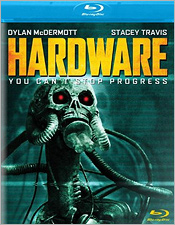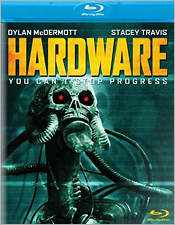Hardware (Blu-ray Review)

Director
Richard StanleyRelease Date(s)
1990 (October 13, 2009)Studio(s)
Palace Pictures (Severin Films)- Film/Program Grade: B+
- Video Grade: A-
- Audio Grade: A-
- Extras Grade: A
Review
The dividing line between horror and science fiction is frequently blurred. Both camps lay claim to such diverse examples as Godzilla, Alien and even Frankenstein. But when you have an unstoppable killing machine stalking its outmatched prey in a confined space, I’d say horror trumps the sci-fi element. And in Richard Stanley’s low-budget dystopian sci-fi flick Hardware, you have literally just that.
A mysterious nomad (Carl McCoy, lead singer of the band Fields of the Nephilim) digs up the remains of a seemingly defunct android from the apocalyptic sand dunes of The Zone. Back in the city, he sells it to ex-soldier Dylan McDermott, who brings the head home to his sculptor girlfriend (Stacey Travis) as a Christmas present. As it turns out, the droid is the M.A.R.K. 13, programmed to eliminate anyone and everyone by any means available. It’s also able to recharge itself from any power source. It wakes up and rebuilds itself with buzz saws and power drills, then sets about fulfilling its objective: death.
Originally released back in 1990 to a fair amount of critical and commercial success, Hardware subsequently dropped off the face of the earth, another victim of squabbling over rights of ownership. I was lucky enough to catch it during its original release and am glad to see my fond memories of it were not unfounded. Hardware is a simple enough story set against a complex, detailed backdrop.
Stanley takes his time setting the scene. During the movie’s first half, you get a sense of the post-apocalyptic world and a feeling there is more here than time and budget allows us to explore. It’s a rich environment to play in but it all sort of goes out the window once the M.A.R.K. 13 comes to life. The real meat of the story is Travis vs. Robot and Stanley remains clearly focused on it for the second half. In that sense, the movie owes more to Ridley Scott’s Alien than it does to James Cameron’s The Terminator. Scott’s movie does a better job building suspense but Stanley proves very effective at gory shock-scares. Plus, he doesn’t have to resort to a cat to get you to jump, which earns him points in my book.
Hardware makes its long-awaited digital debut as a two-disc DVD or a single-disc Blu-ray courtesy of Severin Films. In high-def, Hardware is a wonder to behold. This is a spectacular looking disc, perfectly transferred to HD with vibrant colors and lovely texture. The Dolby 5.1 sound is equally good, especially when it comes to the great soundtrack (with a score by Simon Boswell and songs by Ministry, Public Image Ltd., and more). As for extras, Hardware isn’t as encyclopedic as Subversive Cinema’s almost ridiculously comprehensive 5-disc release of Stanley’s Dust Devil from a few years back but it’s still a home run.
The fun kicks off with No Flesh Shall Be Spared, an extensive making-of documentary featuring new interviews with Stanley, Stacey Travis, composer Simon Boswell, director of photography Steven Chivers, and many others. It’s a terrific, in-depth piece. Stanley also contributes a separate interview detailing his ideas for the unmade Hardware 2. Three of Stanley’s short films are included: the lengthy Incidents in an Expanding Universe (an early Super-8 prototype of Hardware), Rites of Passage, and a strange but amusing newer short, The Sea of Perdition from 2006. You also get a selection of deleted and extended scenes and a commentary by Stanley, joined by an unnamed interviewer whom I assume is Severin’s David Gregory. [CORRECTION: The mystery revealed! Stanley’s interviewer is DVD producer Norm Hill... and a first-rate job he does, too.] There is a little bit of unavoidable overlap between the commentary and the other extras but in general, Stanley keeps to fresh material here, making it well worth your time.
It’s virtually impossible to intentionally make a cult movie and if you try, you’re almost certainly doomed to failure. But Richard Stanley’s Hardware was probably always destined to be a cult favorite. From its downbeat setting to its practical effects to its casting of rock icons like Iggy Pop and Lemmy, Hardware has cult classic written all over it and its legend has only grown in the almost twenty years since it was readily available. This is not a movie that should have languished in obscurity and Severin deserves a great deal of praise for bringing Hardware back in such high style.
– Dr. Adam Jahnke

